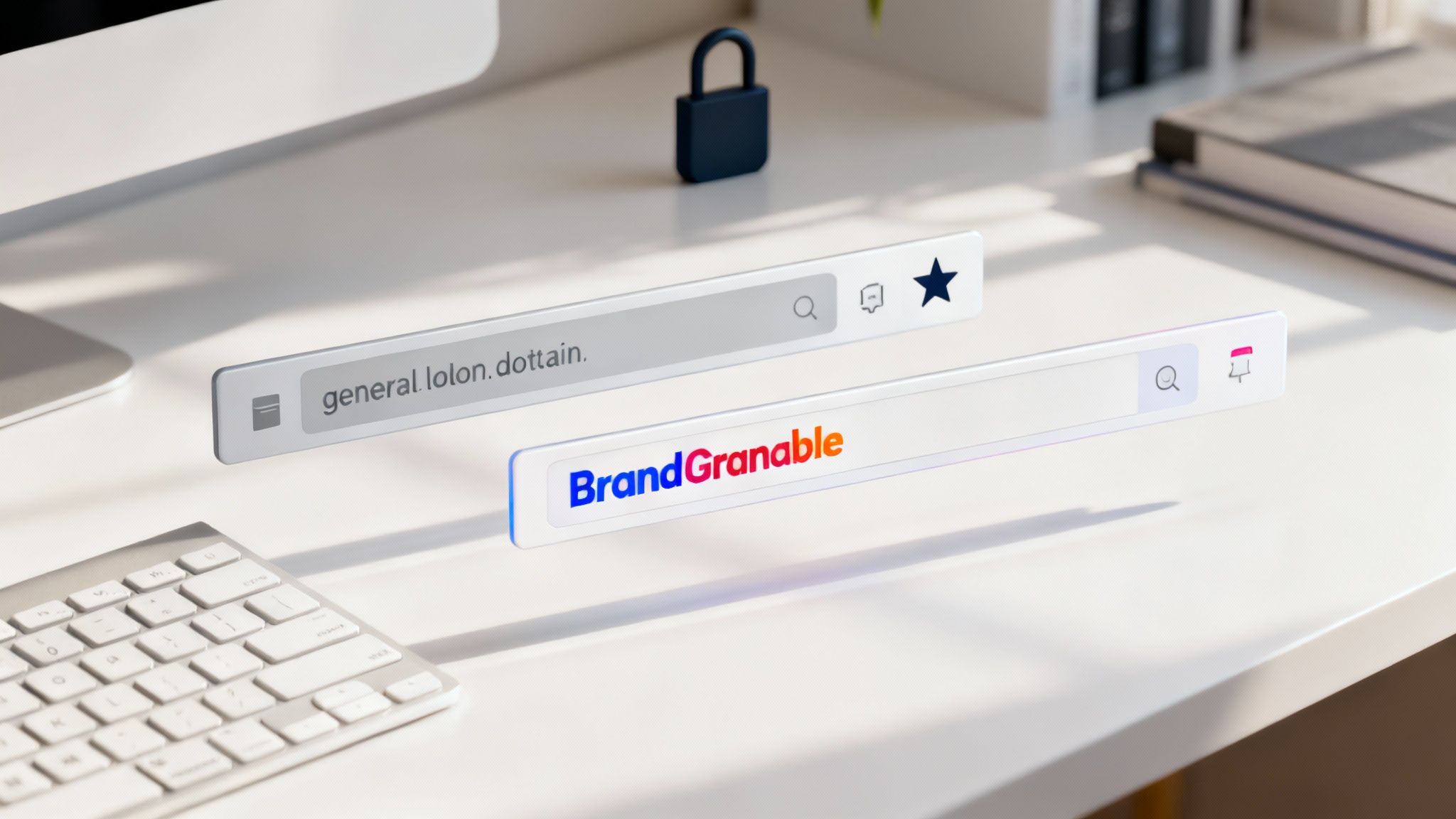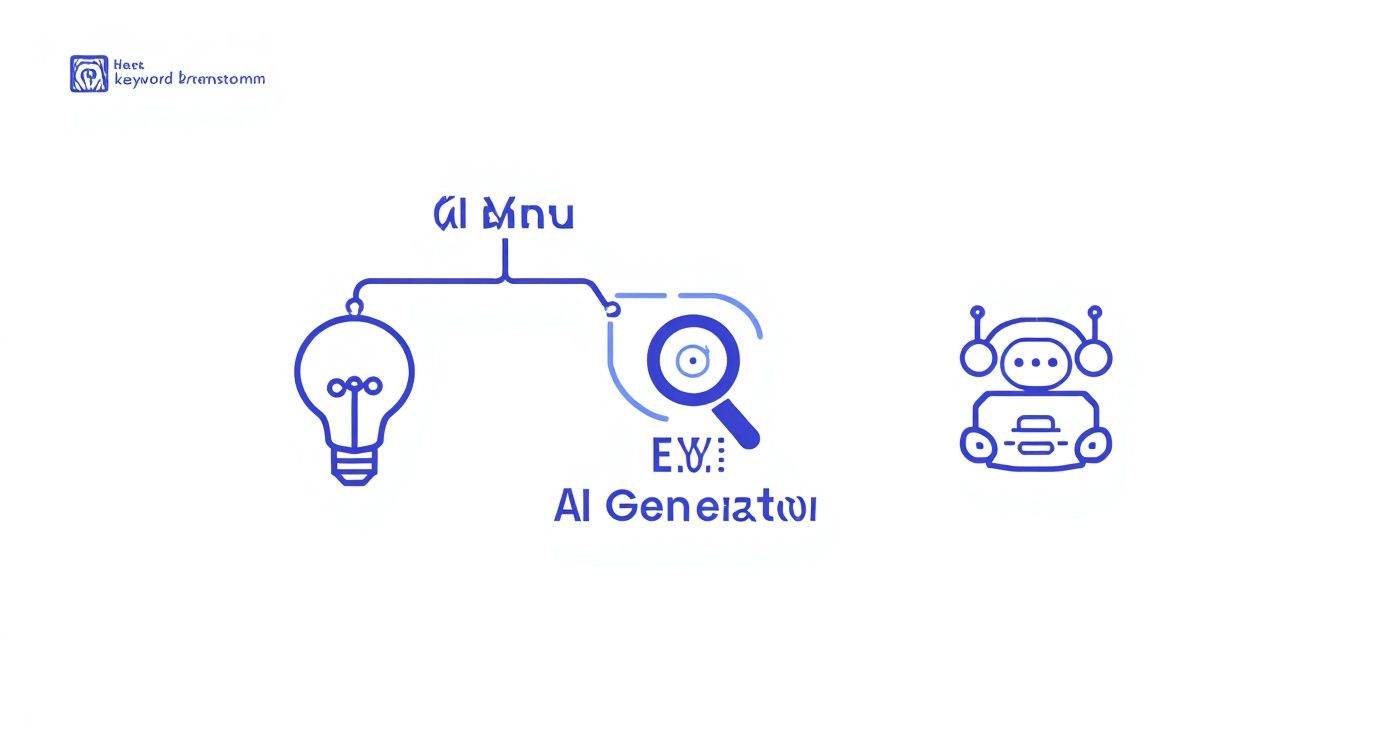Using a Domain Name Ideas Generator to Find Your Perfect Name
This article was assisted with AI. We may include links to partners.
Struggling to find the perfect domain name? A domain name ideas generator is an invaluable tool. You provide it with a few keywords related to your business, and it generates a list of available web addresses. It's a powerful way to move past a creative block, suggesting unique and brandable names instead of leaving you staring at a blank screen.
Why a Great Domain Name Matters for Your Brand

Before generating ideas, it's essential to understand why your domain name is so important. It's not just a technical address for your website; it's the digital foundation of your brand. Think of it as the sign above your shop door—it's often the first thing a potential customer sees. A strong, clear name builds immediate trust.
This is especially critical in today's crowded online space. The market for domain registrations is growing rapidly, with forecasts predicting 459.9 million registered names by 2030. In such a vast market, a memorable name helps you stand out.
The Foundation of Your Online Identity
A well-chosen domain becomes a key part of your brand. It appears on your business cards, in your email signature, and at the top of search results.
For instance, a local bakery named artisansourdough.com immediately tells customers what they offer and sounds professional. Compare that to a generic name like bestbakingonline123.com, which is forgettable and less trustworthy.
A great name achieves several goals at once:
- Actionable Tip: Choose a professional domain to make your business appear legitimate from the first interaction.
- Actionable Tip: Pick a short, catchy name that is easy for customers to remember and type into their browser.
- Actionable Tip: Ensure your domain reinforces your brand identity every time someone sees it.
Your domain is your brand's digital handshake. It should be firm, confident, and easy to remember, instantly conveying who you are and what you offer. A weak or confusing name can make potential customers hesitate before they even visit your site.
Tangible Impact on Marketing and SEO
Your domain name has a direct impact on your marketing and visibility in search engines. Search engines like Google use your domain as a clue to understand your site's topic, and a relevant name can provide an SEO advantage.
More importantly, a great name is easier to share. Word-of-mouth is a powerful marketing tool, and customers won't recommend a name they can't remember.
For a deeper dive, read our guide on why your business needs a custom domain name. This upfront choice has a massive long-term impact on your brand's success.
Manual Brainstorming to Fuel Your Search

Before using an AI tool, start with manual brainstorming. Any domain name ideas generator is only as good as the keywords you provide. Think of this as gathering high-quality ingredients for a recipe. The better your initial words and concepts, the more relevant the final suggestions will be.
Explore every angle of your brand. What feeling do you want to evoke? What problem do you solve? A little preparation here will save you hours of sorting through irrelevant options later.
Create a Core Keyword Map
Actionable Tip: Grab a blank page and write your primary service or product in the center. For a freelance photographer, the core keyword is "photography." Now, branch out with related concepts.
Consider different aspects of your business:
- Your Niche: Do you specialize in weddings, portraits, or real estate? Add these as branches.
- Your Style: Is your work candid, modern, timeless, or artistic? These are excellent descriptors.
- Your Location: Adding your city or region, like denver or rockymountain, helps create a local identity.
- Action Words: Verbs like capture, moments, and frames add a dynamic feel.
This visual map helps you see connections you might otherwise miss. Combining "candid" and "moments" could lead to a name like CandidMoments.com—far more memorable than JaneDoePhoto.com.
A domain name generator is a powerful tool, but it's not a mind reader. Your initial list of keywords is the most important input you can provide. The more diverse and thoughtful your list, the better your chances of discovering a name that truly fits.
Think Beyond the Obvious
Once you have your core words, it's time to dig deeper. Don't be afraid to experiment with language to find names that truly stand out.
Actionable Tip: Use a thesaurus to find synonyms for your main keywords. Instead of "bright," you might find "luminous," "vivid," or "radiant." These alternatives can add a layer of sophistication. A graphic designer could go from the generic BrightDesigns to the more memorable LuminousCreative.
Also, consider industry-specific terms. A coffee shop could use words like roast, brew, or grind. A tech startup might use terms like pixel, code, or data. These words act as a shorthand, signaling expertise and connecting with an informed audience.
Using an AI Domain Name Ideas Generator
Alright, you've done your brainstorming and have a solid list of keywords. Now it's time to let technology do the heavy lifting. Using an AI-powered domain name ideas generator, like the one built into the Solo AI Website Creator, is like having a creative partner that can generate hundreds of ideas in seconds.
This isn't about the AI replacing your creativity; it's about amplifying it. The tool takes your core concepts, combines them, finds synonyms, adds prefixes and suffixes, and checks for availability—all at once. What used to be a tedious process becomes a fun and efficient discovery mission.
This is why the market for domain name generator software is growing. It was recently valued at around $2 billion and is expected to double in the next five years. Small businesses and creators need a digital identity, and they need it fast. You can find more data on this trend in these market report analytics.
Getting the Most Out of Your Keywords
The quality of the names you get back is a direct reflection of the keywords you provide.
Actionable Tip: Start by entering your most critical keyword—the one at the heart of your brand. If you’re a custom furniture maker, that might be "woodcraft" or "artisan."
Then, experiment with different combinations:
- Niche + Style: Try prompts like "rustic woodcraft" or "modern furniture." The AI will generate ideas based on those themes.
- Action Words: Include verbs that describe what you do, like "build" or "design." This can lead to dynamic names like DesignInWood.com.
- Location, Location, Location: If you're a local business, adding your city, like "brooklyn artisan," can uncover great geo-targeted domains.
Don't just do one search. Keep mixing and matching keywords from your brainstorming map to find the perfect combination.
For instance, the Solo AI Website Creator asks for your business category and a quick description. It uses that information to generate not just a name but an entire site concept.
As you can see, a few simple inputs can lead to highly targeted suggestions, making the process intuitive even for non-technical users.
Sifting Through the Gold: How to Refine and Filter
After the first run, you'll have a long list of potential names. The next step is to narrow it down. Most generators come with filters to help you.
Think of the AI as your brainstorming assistant, not the final decision-maker. Its job is to cast a wide net and show you what's possible. Your job is to use your human judgment to pick the name that truly captures your brand's voice and vision.
Actionable Tip: Use filters to refine your search results:
- Domain Extension: If you want a .com, hide everything else. Or, explore what’s available with newer Top-Level Domains (TLDs) like .io or .shop.
- Character Length: Shorter names are almost always better. Set a maximum character count to find concise options.
- Keyword Placement: Some tools let you specify if your main keyword should be at the beginning or end of the domain.
As you review the suggestions, ask yourself: Is it easy to spell? Does it sound good when spoken aloud? Are there any unintended meanings? This final human touch turns a generated idea into a powerful brand asset.
Choosing the Right Domain Extension (TLD)
The name you choose is only half the equation. The letters that come after the dot—the Top-Level Domain, or TLD—are just as crucial. Your TLD sends a quick signal about your brand’s purpose and credibility.
While .com has long been the standard, there are now more options than ever. A strategic choice here is vital. The right TLD can reinforce your brand identity, while the wrong one can cause confusion.
This decision tree gives you a visual on how this all fits together, starting with your initial keywords and leading you through manual and AI-powered discovery.

As you can see, whether you brainstorm manually or use a domain name ideas generator, the final step always involves strategic selection—and that includes your TLD.
Classic TLDs: The Tried and True
For most businesses, .com is still the top choice. It’s the most recognized and trusted TLD globally, making it the default for users typing a URL from memory. If your desired .com is available, it’s almost always the best option for establishing a broad, commercial presence.
Other classic TLDs also have their place:
- .org: Traditionally for non-profits and community organizations. It signals a mission-driven purpose.
- .net: Originally for network technology companies, it's now a common alternative when a .com is taken, though it lacks the same instant recognition.
While .com is king for a reason, don't end your search if it's unavailable. The modern web offers a vast array of niche extensions that can be even more effective for specific brands, allowing you to create a URL that's both unique and descriptive.
The Rise of Niche and Industry-Specific TLDs
The options today go far beyond the classics. Over 1,200 new generic top-level domains (gTLDs) have been introduced, accounting for around 38 million registered domain names. This gives you a chance to be creative and specific.
This expansion means you can get a TLD that perfectly matches your industry. For example:
- .shop or .store for an e-commerce business.
- .io or .ai for a tech startup.
- .photo for a professional photographer.
- .blog for a content creator.
Using an industry-specific TLD can instantly communicate what you do. A name like freshroast.coffee is incredibly clear and memorable. For those just starting, it’s helpful to understand the landscape of options, especially when looking into free website builders and domain names.
Common TLDs and Their Best Use Cases
| TLD Extension | Primary Use Case | Key Consideration |
|---|---|---|
| .com | Commercial businesses, general websites | The most recognized and trusted TLD worldwide. Always the first choice if available. |
| .org | Non-profits, charities, community groups | Signals a mission-driven or informational purpose. Can seem out of place for a for-profit brand. |
| .net | Network services, tech companies, .com alternative | Originally for internet infrastructure, now a common backup. Less memorable than .com. |
| .co | Startups, modern companies, global brands | A shorter, trendier alternative to .com. Popular with the tech and startup communities. |
| .io | Tech startups, SaaS, online projects | Very popular in the tech world, but might be unfamiliar to a non-technical audience. |
| .ai | Artificial intelligence companies, tech tools | Directly signals a focus on AI. Highly specific and modern. |
| .store | E-commerce websites, online retailers | Clearly communicates that your site is a place to buy things. Instantly recognizable. |
| .blog | Personal blogs, content creators, publications | Perfect for content-focused sites, immediately setting audience expectations. |
Ultimately, your TLD choice should align with your audience and long-term goals. While a trendy .io is great for a tech company, it might confuse customers looking for a local bakery. Balance creativity with clarity.
How to Secure Your New Domain Name
You’ve done the hard work: you’ve brainstormed, used a domain name ideas generator, and found the perfect name. Now it's time to claim your digital real estate before someone else does. Don't wait—great domain names are registered every minute.
This final step is about more than just the purchase. It's about ensuring your new online identity is built on a solid foundation. A few quick checks now will prevent major headaches later.
Your Pre-Registration Checklist
Before you click "buy," run through these final checks to ensure the name is not only available but also free of hidden issues.
- Final Availability Check: The generator said it was free, but things move fast. Go to a domain registrar and type in your name one last time to confirm it hasn't been taken.
- Trademark Search: This is crucial. Do a quick search on the U.S. Patent and Trademark Office (USPTO) database to avoid legal disputes over an existing trademark.
- Social Media Handle Check: Check if your name is available on Instagram, X (formerly Twitter), Facebook, and other platforms you plan to use. Brand consistency across channels is key.
Securing your domain is the finish line of the naming process. Don't just rush through the checkout. Take a moment to verify availability, check for trademark conflicts, and consider extras like privacy protection. This foresight protects your brand's future.
The Registration Process Simplified
Once your name has passed the final inspection, it's time to register it. The process is straightforward, but a couple of options during checkout are important.
When you register, you must provide contact information, which becomes public in the WHOIS database. This is where domain privacy is essential.
Actionable Tip: Always add domain privacy protection (also called WHOIS privacy). It replaces your personal information with the registrar's details, protecting you from spam and unwanted calls. It's a small annual fee for significant peace of mind.
Another critical setting is auto-renewal. Actionable Tip: Always enable auto-renewal for your domain. Forgetting to renew can be a disaster—your domain could expire and be bought by someone else, taking your website and brand offline.
Once you’ve secured your name, you'll need to consider next steps like website hosting and domain name services. If you're using an all-in-one platform like the Solo AI Website Creator, these services are often bundled together. For more on that, read our guide on how to get a a free website with a custom domain.
Common Questions About Finding a Domain Name
You’ve brainstormed, used the tools, and are close to choosing a name. But a few questions might still remain. Let's address the most common concerns to help you move forward with confidence.
What If My Perfect .Com Is Taken?
This is a common roadblock. If the name you love is gone, don't give up. Use this as an opportunity to get more creative.
Actionable Tip: Before moving on, try these simple tweaks:
- Add a verb: Instead of
PrimePizzeria.com, tryGetPrimePizzeria.com. It's active and memorable. - Get local: If you serve a specific area, use it.
PrimePizzeriaNYC.comis clear and likely available. - Look beyond
.com: The world of TLDs is huge. If you're a tech startup,Prime.iocould be a perfect fit.
View this as a nudge toward a name that might be more unique in the long run.
Should I Buy a Domain Name That Is For Sale?
You've found the perfect name, but it's already owned and listed on a marketplace for a high price. Be cautious here, especially if your business is new.
Premium domains can cost anywhere from a few hundred to tens of thousands of dollars. Unless that specific name is absolutely critical to your brand identity and you have the budget, it's smarter to find an available alternative. In the early stages, that money is better spent on building and marketing your business.
A great business can succeed with a good domain name, but a great domain name can't save a bad business. Focus on finding a strong, available name and invest your capital in growth.
How Long Should My Domain Name Be?
When it comes to domain length, shorter is better. You want a name that's easy to remember, type, and say aloud.
Actionable Tip: Aim to keep your domain name between 6 and 14 characters.
Think of well-known brands: Google, Apple, Amazon. They’re short, catchy, and memorable. While you don't need a single-word, million-dollar domain, always prioritize clarity and conciseness. If it's a mouthful, it's probably not the right choice.
Ready to turn your perfect domain name into a stunning website? The Solo AI Website Creator can build your professional online presence in minutes, complete with hosting and SEO tools. Get started for free at Soloist.ai and bring your brand to life.
